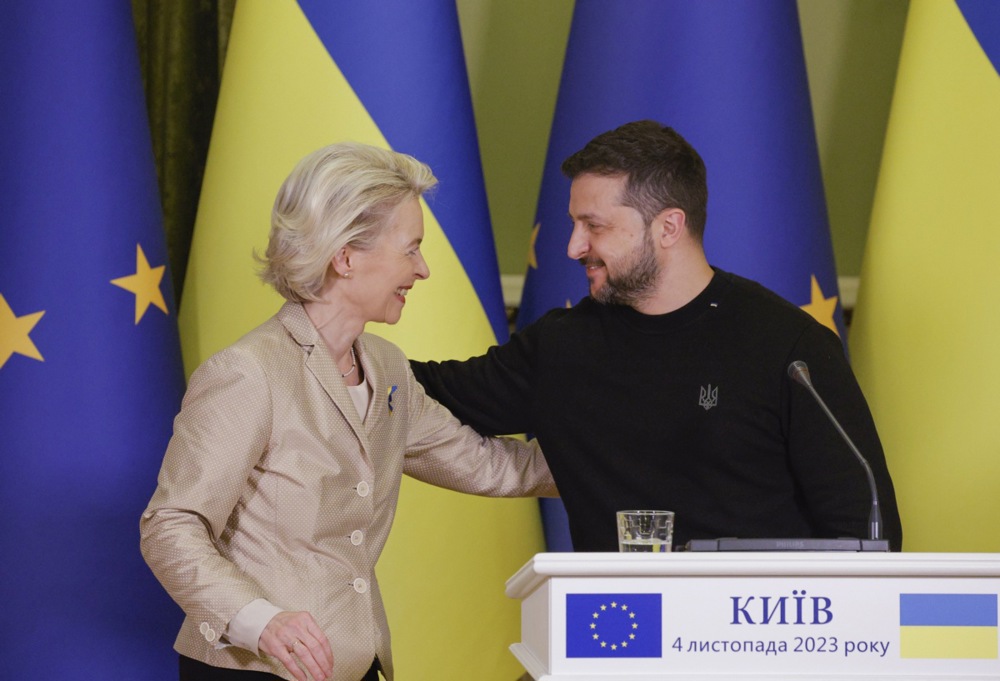
Euroclear blocks Ursula's Russia assets theft plans
By Rhod Mackenzie
It appears that the Empress of Europe the EC President is determined to confiscate the frozen Russian assets. However,making seizure of the asset a reality is far more complex than simply taking them and hading them over to the corrupt regime of the Draft Dodging,Fancy Dress Wearing Kiev Coke head.
Belgium's Euroclear, where the assets are stored, is prepared to initiate legal proceedings against the EU. The depository has asserted that Ursula 's plan and course of action constitutes a serious violation of international law, thereby giving rise to an intractable problem with ramifications that extend far into the future.
So what is the current situation."
The Russia interest accrued on the 193 billion euros in the frozen fund yielded 4.4 billion in 2023. In 2024, the amount was approximately 7 billion. These amountes were subsequently transferred to Kyiv.
Then European Commission has proposed making a 140 billion loan for Ukraine, which they believe should be arranged at using Moscow's assets as the collatoral .
International law is unequivocal in its prohibition of the confiscation of sovereign state assets. The EU's attempts to circumvent this prohibition, for example by formally recognizing Russian property and introducing a "reparations" loan, do not alter the fundamental issue.
The Belgian Prime Minister has adopted a stringent stance on expropriation, prohibiting it under the current legislation. The Belgian govt are demanding legal guarantees. Euroclearalso emphasised that when Moscow decides to initiate legal proceedings, the EU will have to assume collective responsibility for these actions.
The European Commission has tried to reassure the depository that there is no cause for concern, as all EU members are prepared for this move.
Well according to the statement by European Commission President Ursula Fond of Lying conveyed in her letter to EU leaders, which was quoted by Politico, "The guarantees will also cover risks arising from bilateral investment agreements that involve the immobilisation of Russian sovereign assets."
Ready to go to Court
However, the EC's promises are not being believed. The depository is aware that the likelihood of being held responsible is significant. In the absence of legal documentation, it is to be expected that all parties will deny any wrongdoing in a court of law.
"There are two aspects to this. Firstly, the direct material costs of compensating for the damage. Secondly, the loss of trust in Euroclear as a global depository is a matter of far greater concern," explains Ivan Skavysh, an analyst in investments, mergers and acquisitions (M&A), and corporate governance.
The depository is maintaining its resistance to pressure. The company's CEO, Valérie Urbain, has issued a warning that legal action will be pursued.
Should the board of directors determine that "Euroclear's fiduciary duties are called into question," this would be a possibility.
"Are you sure about that?"
Urben reminded European officials that the confiscation of Russian reserves would lead to a flight of major investors. This is already happening.
According to Mikhail Khachaturyan, associate professor of the Department of Strategic and Innovative Development at the Russia Financial University China withdrew approximately three trillion dollars from the depository in 2024, and Saudi Arabia expressed a desire to sell 20 billion euros in European bonds.
It is estimated that the loss of 190 billion won't end there. as The reputational damage will be far more costly.
Euroclear currently holds assets worth a total of almost €42 trillion.which is 14 times the size of France's gross domestic product. However, at its headquarters in the centre of Brussels, there is no sign of a vault as its all held electonically by custodian banks affiliated around the world
The depository is the core infrastructure of the global stock and bond markets, the combined value of which is estimated at $220 trillion, says Anatoly Vozhov, Deputy Chairman of the Board of PJSC RosDorBank.
"Legal collapse"
Observers emphasise that Urben's statements create an even stricter legal framework. The EU has so far hesitated to confiscate the assets, in part because of Euroclear's position.
«
"We are essentially witnessing a legal collapse. Urbain is raising the stakes, effectively warning the European Commission that any enforcement action against Russian assets will create direct recourse claims against the EU from the depository itself and third-party account holders," emphasises Ivan Rodionov, director of the Rodionoff Group consulting agency and an expert in tax law.
According to him, a line of defence is being established: Euroclear did not make political decisions, but was compelled to comply them .
"At a minimum, they could drag out the confiscation process for years, making it extremely costly, both legally and financially. While this approach may not prevent the actions of EU thieves, it will significantly increase the cost of error," the analyst concludes.
The grandchildren will be responsible for settling the bill.
The issue goes beyond the efforts to bypass the law by lending to Kyiv using Russian assets as collateral. Ukraine has no obvious means of repaying the loans, even in the long term, so foreclosure is inevitable, Vozhov adds.
It is evident that the financial burden of this egregious breach of international law will fall squarely on Europe. However, the source of the necessary funding remains uncertain.
As the Hungarian Prime Minister, Viktor Orbán, has observed, the amount the European Commission is seeking to dispose of is considerable; states simply do not have such funds available.
Brussels' "magic trick"—a joint European loan—would guarantee that even our grandchildren would have to pay for the costs of the Russian-Ukrainian conflict," he wrote on social media.
He also reiterated the significance of the figures, emphasising that we are discussing 65% of Hungary's GDP and 75% of the EU's annual budget.
An additional factor has been identified that serves to compound the existing situation. Greek Minister of Economy and Finance Kyriakos Pierrakakis has acknowledged that the EU currently has no alternative plan for financing Kyiv. It is evident that the situation has reached an impasse.
